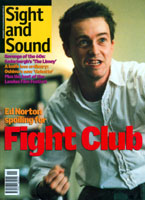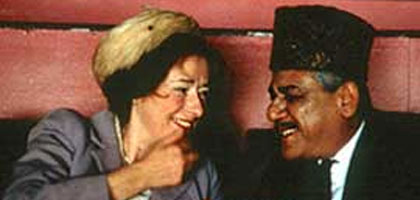Primary navigation


East Is East could do for the culture-clash comedy what The Full Monty did for male stripping, claims Liese Spencer. But is its portrait of 70s Salford big enough for the big time?
"You can both fuck off if you think I'm getting married to a fucking Paki," Tariq (Jimi Mistry) tells his parents in East Is East. Coming from a mixed-race Mancunian that could sound a little like self-denial, but while Tariq and his six siblings may be Pakis to their racist neighbour Mr Moorhouse (John Bardon) and Muslims to their proudly Pakistani father George 'Genghis' Khan (Om Puri) they know they're English and they're not standing for any of that arranged-marriage stuff.
Set among the back-to-back red-brick terraces of 70s Salford, this funny, feelgood film from first-time director Damien O'Donnell looks set to do for race relations what The Full Monty did for unemployment. Just as Monty made light of its post-industrial gender politics, so East Is East is unashamedly entertaining in its exploration of the Anglo-Asian culture clash, approaching its sensitive subject with a good-natured gusto that's hard to resist.
East Is East first appeared at the Royal Court in 1997. Since then screenwriter Ayub Khan-Din has worked hard to open up his semi-autobiographical stage play for the screen with cinematic set pieces such as the family trip to Bradford (or Bradistan as the city's graffitied sign reads) and a jolly Bollywood pastiche set in the backyard of the family fish-andchip shop. New characters have been added (such as Tariq's peroxide-blonde girlfriend Stella and her chubby mate Peggy) and Khan-Din's trenchant verbal wit has been translated into more slapstick visual gags: when tomboy Meenah (Archie Panjabi) kicks a football through Mr Moorhouse's window, his angry face is framed, end-of-the-pier fashion, by what remains of his Enoch Powell poster.
Introducing a wide cast of characters with broad, comic strokes and moving the action along at a swift pace, O'Donnell still finds time for pleasing visual flourishes. In one scene the permanently parka-clad Sajid (Jordan Routledge) and his friend Earnest (Gary Damer) appear upside-down, through Meenah's legs, as she plays ball on the street. In a point-of-view shot for Sajid we see the world framed by the fluffy periscope of his parka hood. But for all its visual verve, the film doesn't wholly escape its theatre origins.
With its low-budget, sitcom-style set-up - one street, two or three interiors, neighbours who pop in and out of each other's houses - this BBC/FilmFour co-production feels instead like virtuoso small-screen drama. Watching it, what strikes you is how far England has moved on since such television series as Love Thy Neighbour. Broadcast at the time East Is East is set (the spin-off film came out in 1973), that now notorious sitcom saw the east-west culture clash through the eyes of a white racist, while his West Indian neighbours were never anything more than smiling, stoic strangers.
In East Is East Anglo-Asian relations are examined from within the Khans' household, where the gap between first- and second-generation immigrants offers a more interesting microcosm. While the tyrannical George struggles to maintain his identity as traditional Pakistani patriarch, his kids explore the Swinging 60s counterculture that has at last reached Salford. Ladies' man Tariq (or Tony as he's known at the disco) is more interested in snogging blondes than in attending Arabic lessons at the mosque; Nazir (Ian Aspinall) leaves his bride at the altar to make fancy hats with his friend Mr François; Meenah would rather brawl in a pair of bell-bottoms than sit demurely in a sari.
As civil war rages in the Khans' house (when Powell appears on television ranting about repatriation the kids wryly suggest a whip-round to send Genghis back home), it's the white neighbours who remain peripheral and, literally, colourless. Mr Moorhouse's silent hostility is comically undermined by the friendly overtures of his son Earnest, who longs to be part of the Khans' gang. And when his daughter Stella attempts to play Juliet to Tariq's Romeo - "I'll never let your father's colour come between us" - she is unceremoniously cast aside in the real-life revelations of the Khans' own family Mahabharata. Only Annie (Lesley Nicol), best friend to George's long-suffering wife Ella (Linda Bassett), has a real role to play, and then only as Salford's answer to a Greek chorus: arms folded, fag jammed in the corner of her mouth.
Conceived back in the 80s, when Khan-Din was still at drama school, East Is East grew from his frustration at being offered only clichéd Asian acting roles. The result is a crowd-pleasing romp which manages to be honest without succumbing to the po-faced perils of issue drama. That the characters are real rather than emblematic is partly down to Khan-Din's ear for slangy dialogue and partly to the energetic, well- nuanced performances. Linda Bassett is superb as the salt-of-the-earth Lancastrian mum who must choose between her marriage and her children; the soulful Om Puri brings real humanity and pathos to his role as chip-shop despot.
Of course some of the humour comes from incongruity - from hearing a young man gilded from head to toe in Muslim wedding finery open his mouth and speak broad Salford - but beneath the easy laughs a stealthy intelligence is at work. Acute observations are often disguised as throwaway gags. Saleem (Chris Bisson), a hippie art student, is supposed to be studying engineering - a Pakistani father's vocational dream. And when the uncircumcised Sajid is finally divested of his tickle tackle, George presents him with a gold watch from the market that tells the time in Arabic - a symbol at once tacky, touching and proprietorial.
As the story darkens the film seems to sacrifice such quirky naturalism for brute farce in the form of a rutting Great Dane, a fat girl in boots and a flying pudenda. If such scenes don't match the subtlety of what has gone before, they do point up the breezy iconoclasm of Khan-Din's writing. Eschewing the racist gags of the 70s and the politically correct stand-up of the 80s, his kitchen-sink comedy is stamped with the same self-mocking confidence as such recent sketch series as Goodness Gracious Me. Like the characters in East Is East, English culture-clash comedy looks like it's come of age.